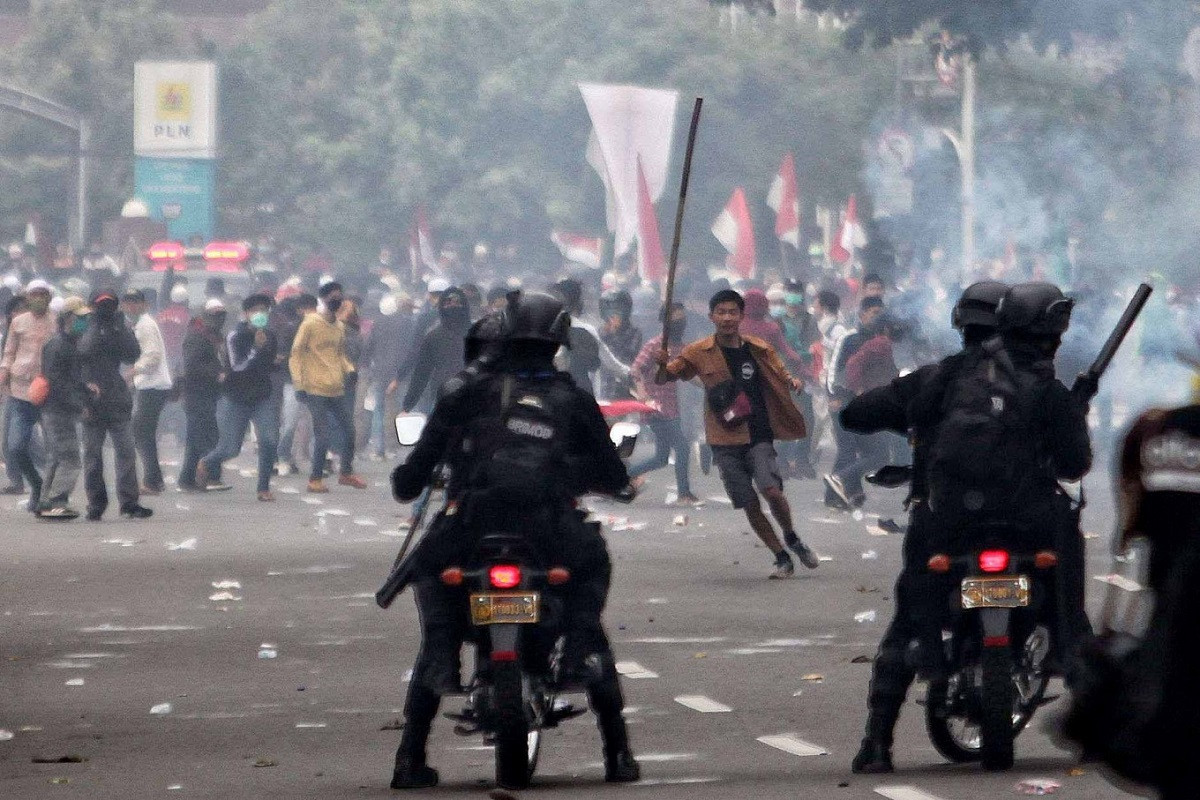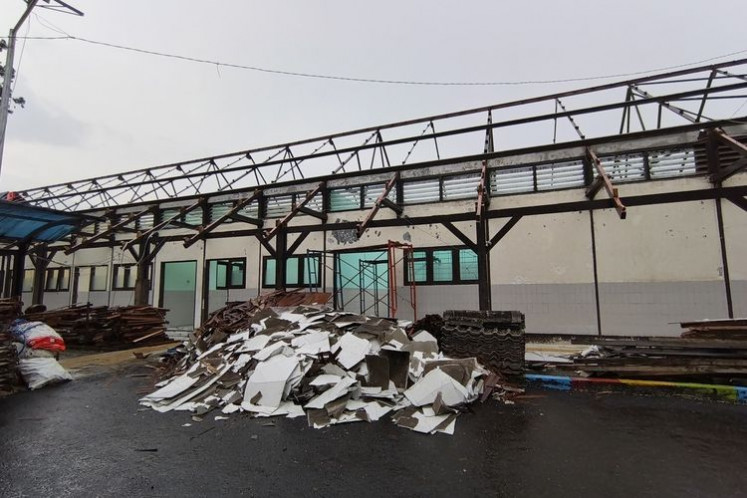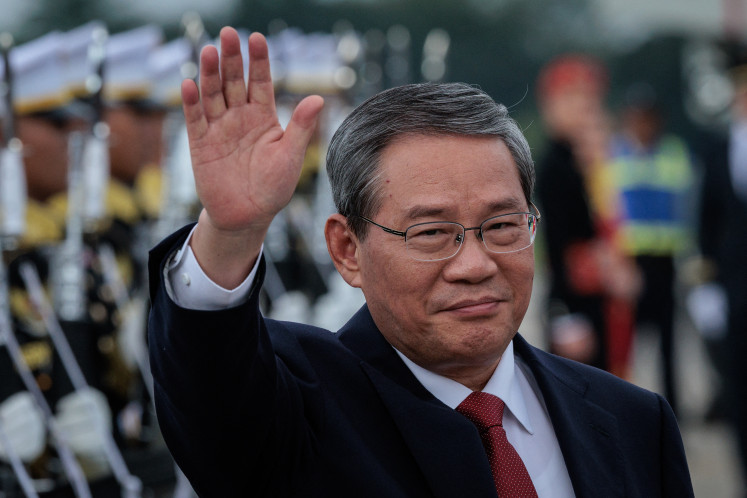Indonesia faces another chapter of jobs law shenanigans
Public discourse has again erupted in relation to the Job Creation Law, this time over a regulation in lieu of law on job creation that was passed just two days before the turn of the year.
Change text size
Gift Premium Articles
to Anyone

T
he controversial Job Creation Law has now been revoked with yet another controversial regulation in lieu of law (Perppu) on job creation. The revocation is a consequence of what was decided last year.
Nov. 4, 2021 marked the day that the Constitutional Court (MK) declared Law No. 11/2020 on Job Creation “contrary” to the 1945 Constitution. Nevertheless, the law is still valid until it is revised in line with the time limit of within two years since the court’s decision was issued.
While critics suggest the government to revise the law with an entirely new participatory and inclusive law, the administration of Joko “Jokowi” Widodo decided to wrap up 2022 by passing the Perppu on job creation, which the President signed on Dec. 30, 2022.
It was issued to address the Constitutional Court decision in November 2021, and a Perppu’s regulatory structure allows the government to “bypass” the conventional lawmaking process.
Nevertheless, comments are piling up, with most pointing out how the government has again tried to “hack” the legislative system to maintain the applicability of the contentious Job Creation Law.
Coordinating Economic Minister Airlangga Hartarto told a press conference at the State Palace on Dec. 30 that the Perppu was issued to anticipate the “urgency” of the global economic slowdown, recession, growing inflation and the threat of stagflation.
Public discourse has centered around Airlangga's reference to the government’s interpretation of “urgency” as the basis for passing the regulation. As it is known, the pandemic restrictions have now been eased, with the Jokowi administration revoking the Public Activity Restrictions (PPKM) imposed in response to the COVID-19 pandemic.
In addition, many appear to be questioning whether the Russia-Ukraine war has had a direct impact on Indonesia’s job creation statistics, while questioning other causes of “urgency” that may not match the Perppu’s agenda.
The 1945 Constitution stipulates that in the case of an emergency, the President has a discretionary right to enact a regulation in lieu of law. Many experts agree that how the degree of an emergency is interpreted depends on various circumstances.
Nonetheless, the only body with the authority to interpret the constitutional provision is none other than the Constitutional Court. The decades-long MK Decision No. 138/PUU-VII/2009 has deemed a Perppu as necessary if the following requirements are met.
First is the emergence of a situation that poses urgent legal issues that need to be resolved quickly through a law. Second is that there is a legal vacuum because the required law does not yet exist or a law does exist but it is insufficient. Third, this legal vacuum cannot be overcome through the usual legislative process because it will take too long, whereas the urgency of the situation requires certainty in its resolution.
Incidentally, the chief justice presiding over the Constitutional Court when the decision was issued was none other than Mahfud M.D., the incumbent Coordinating Political, Legal and Security Affairs Minister.
He even penned a concurring opinion in the court’s decision, stating that the substance of a Perppu is actually a law made under a crisis of coercive urgency, with the reason for its issuance falling under the subjective right of the President.
Fast forward to 2023, and Mahfud seems to remain consistent with his opinion almost 13 years ago. “And based on any theory, determining the precariousness of a situation is the subjective right of the President, which will be explained later in the legislative process during the next DPR [House of Representatives] session,” said.
Mahfud added that the reasons for issuing the Perppu on job creation included other ongoing conflicts that had caused various countries to face food, energy, financial and climate change crises. On this basis, it was constitutional for President Jokowi to sign the Perppu in exercising a President’s rights. It was up to the House to determine if the President’s reason was legally acceptable.
This means that because the Perppu contains a law made during a precarious situation, the DPR must first either assess or conduct a political review on whether it will be approved as a law or not. Only when it becomes a law can the Constitutional Court review it.
As a matter of fact, issuing the Perppu on job creation is foundational to providing legal certainty, as businesses are still waiting for the continuation of the Job Creation Law.
Adding to that, Airlangga explained at the year-end press conference that the government was required to reinstate the deficit cap of less than 3 percent of GDP this year, while private investors were expected contribute 90 percent of the Rp 1.4 quadrillion (US$93 billion) investment target for 2023.
The recently issued Perppu would help ease that process, as the controversial Job Creation Law had already been declared by the Constitutional Court as “not [having] conditionally binding legal force, as long as no amendments are made within two years of the pronouncement of this decision”.
Nevertheless, reflecting on the situation, this arrangement should not prevent the government from setting up a series of public consultations or hearings.
For example, we should take a look at the “cluster” of labor regulations in the Perppu. Instead of accommodating what is already regulated in the Job Creation Law, the new regulation presents a new article on minimum wage.
Under this article, the government can change the formula for calculating minimum wage in certain circumstances, which are yet to be provisionally defined. This new article does not appear in the Job Creation Law that has been deemed conditionally unconstitutional by the Constitutional Court.
Whether the Perppu is declared acceptable or not, the current debate should not focus on the legality of the lawmaking process, as it did not bypass any norms related to drafting a regulation in lieu of law.
What should be the primary concern is how the House process will define the provisions contained of the Perppu. The government must stand by the public’s aspirations: The people might actually accept the regulation in lieu of law if its content was powered by the people’s voices through a political consensus at the House.
***
The writer is a lawyer at Ali Budiardjo, Nugroho, Reksodiputro (ABNR) Counsellors at Law. The views in this article are personal.









